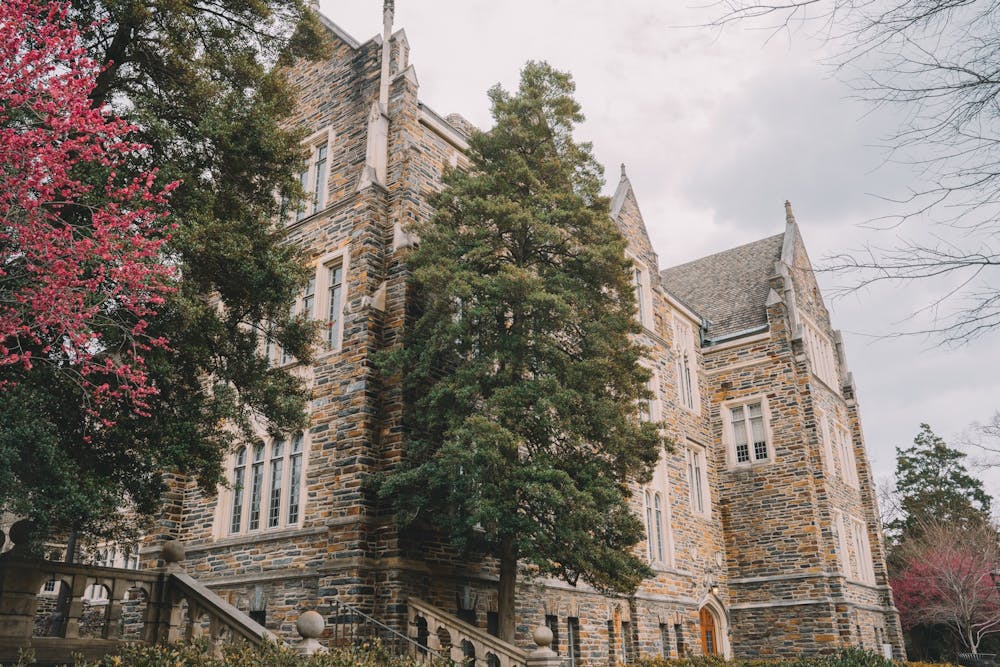As Duke observes its first Juneteenth as a designated holiday, some students and faculty still feel more substantial action is needed to address the inequality that people of color face within the University and Durham.
Duke added Juneteenth as a designated and paid holiday in October, several months after U.S. President Joe Biden signed legislation recognizing Juneteenth as a federal holiday in June 2021. Duke President Vincent Price emphasized that the University is more committed to racial equity and justice “than ever," according to his Friday announcement celebrating Juneteenth.
But Mark Anthony Neal, James B. Duke distinguished professor of African and African American Studies, said that while adding Juneteenth as an employee-compensated holiday is a positive development, more tangible actions, such as wage increases, better serve the many Black residents of Durham that are employed at the University.
Duke announced a wage increase from $15 to $17 per hour in April beginning July 1.
“I think if you were to ask [support staff] what was more important to them, [Price] giving them a day off and acknowledging Juneteenth or increasing their wages, that most of those folks would be more interested in their wages being increased,” Neal said.
As an example of such tangible action, Neal highlighted the work of Duke’s Racial Equity Advisory Council, an advisory body to the University’s leadership created to confront systemic racism and inequality. REAC released its first year report on Wednesday.
Neal, who serves as the co-chair of the REAC’s Communications Subcommittee, said the REAC develops policies that address the inequalities that people of color face at Duke.
“A real recognition of the different experiences of people of color here at Duke, and then developing policy and strategies to address where inequities exist for those people of color … goes a long way in terms of what you can do going forward, and REAC is one effort the University is making to attempt to do that,” he said.
Some students feel that the University should engage more tangibly with the Duke and Durham community to support Black people within these communities, rather than just broadcast messages.
Shruti Desai, associate vice president of student affairs for student engagement, reached out to the Black Student Alliance to see if they would like to deliver a message to the University about Juneteenth this year, according to BSA President Isaiah Hamilton. He and other members chose not to do so.
“We do agree that a student-led campaign would carry more weight, [but] that it would be counterproductive to ask for Black students to pull time away from their summer breaks to compile a message that would celebrate themselves,” Hamilton wrote in his response to Desai, which was obtained by The Chronicle.
According to Hamilton, a BSA-sponsored message would perpetuate stigmas that surround Juneteenth about how some non-Black people use the holiday as an opportunity to “congratulate” Black people on their freedoms and liberties here in the U.S.
Instead, consistent with his appeal to the administration to “recognize Juneteenth not with words, but rather with action,” Hamilton and his peers in the BSA suggested that the University community lay the groundwork for grassroots reform by donating to local, Black-owned businesses, mobilizing initiatives that would aid Black people within Durham and volunteering time and resources in these service areas.
“I will add that I believe that Duke needs to shift its focus from much of its current retrograde work to more preventative work,” Hamilton wrote in his email to Desai.
Victor Clifton, a senior and social chair of the Kappa Omicron chapter of Alpha Phi Alpha Fraternity, Inc., a historically Black fraternity, appreciates Duke’s efforts to commemorate Juneteenth, but he said there is always further room to enhance awareness and visibility around it.
“Something small, or something at least on campus that would have highlighted this event, more than an announcement and more than just an email,” Clifton said.
Get The Chronicle straight to your inbox
Signup for our weekly newsletter. Cancel at any time.
Halle Friedman is a Trinity senior and an associate news editor of The Chronicle's 119th volume.

